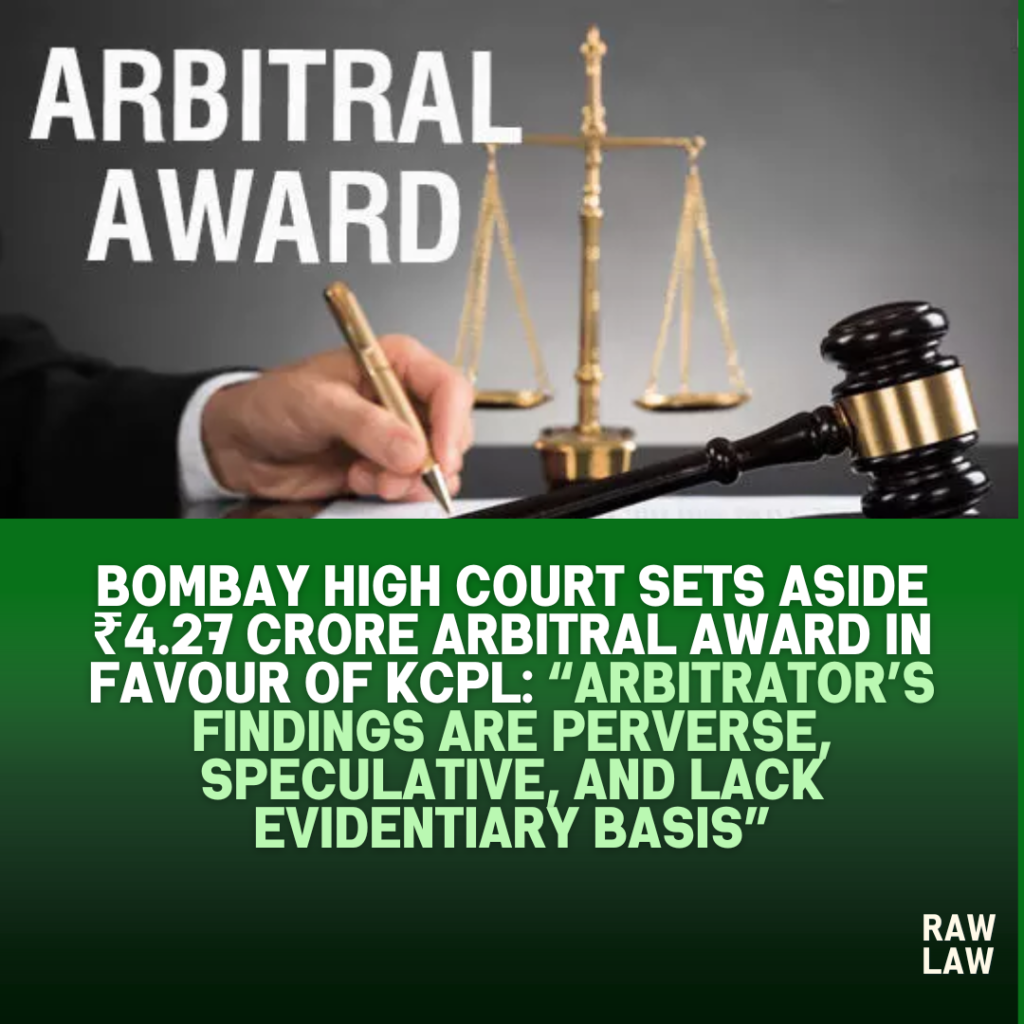Judgment: Board of Control for Cricket in India v. KCPL and RSW Infrastructure Limited
Date: 12 June 2024
Bench: Justice Manish Pitale, Bombay High Court
Court’s Decision
The Bombay High Court allowed the petition under Section 34 of the Arbitration and Conciliation Act, 1996, setting aside an arbitral award of ₹4.27 crores granted in favour of KCPL by the Arbitral Tribunal. The Court held that the Arbitrator had acted in patent disregard of contractual terms and had awarded damages without any evidence or justification.
“The impugned award suffers from perversity… the reasoning of the Arbitral Tribunal… cannot be sustained in the eyes of law.”
Facts
The dispute arose from a 2007 contract between the Board of Control for Cricket in India (BCCI) and KCPL for constructing the BCCI headquarters at Wankhede Stadium, Mumbai. In 2009, delays occurred, prompting BCCI to terminate the contract, alleging breach and poor performance. KCPL initiated arbitration seeking compensation for wrongful termination and damages. The Arbitral Tribunal awarded ₹4.27 crores to KCPL, prompting BCCI to file a Section 34 petition challenging the award.
Issues
- Whether the Arbitral Tribunal’s award was liable to be set aside under Section 34 on the grounds of perversity, non-application of mind, and lack of evidence.
- Whether the Tribunal had failed to appreciate documentary evidence and acted contrary to the contract.
Petitioner’s Arguments (BCCI)
BCCI argued that:
- The Arbitral Tribunal disregarded contractual clauses, particularly Clause 3.5.0, which allowed termination in case of delays.
- The Tribunal’s findings were based on assumptions without examining material evidence.
- No actual evidence supported the award of ₹4.27 crores as damages; the award was speculative and violated Section 34(2)(b)(ii).
- The Tribunal had misread correspondence and wrongly concluded that BCCI was in breach.
Respondent’s Arguments (KCPL)
KCPL contended that:
- The termination was illegal and abrupt, as time was not the essence of the contract.
- They had completed substantial work by the time of termination and were not at fault.
- The Tribunal had rightly awarded damages based on project value and loss due to wrongful termination.
Analysis of the Law
The Court analyzed the reasoning of the Tribunal vis-à-vis the documentary evidence and held that:
- The Tribunal ignored critical correspondence showing that BCCI had raised repeated concerns about delays.
- The award failed the test of reasonableness and judicial review under Section 34, as it lacked a factual foundation and was speculative.
The Court reiterated the principle that:
“Award must be based on cogent evidence and cannot be the result of mere guesswork.”
Precedent Analysis
- Associate Builders v. DDA (2015) 3 SCC 49
Cited for the proposition that an arbitral award can be set aside if it is perverse or in contravention of fundamental policy of Indian law. - Ssangyong Engineering v. NHAI (2019) 15 SCC 131
Relied upon to demonstrate that awards suffering from patent illegality or ignoring contractual terms are liable to be set aside under Section 34. - Delhi Airport Metro Express v. DMRC (2022) 1 SCC 131
Emphasized that courts can interfere when arbitrators render awards ignoring contractual obligations or acting without evidence.
Court’s Reasoning
Justice Pitale found that:
- The Arbitrator’s conclusion that time was not the essence of the contract contradicted Clause 3.5.0 and the communication record,
- The award of ₹4.27 crores was arbitrary and unsubstantiated. There was no expert valuation or material basis.
- The Tribunal incorrectly shifted the burden of proof onto BCCI.
- The award not only violated Section 34(2) but also failed the Wednesbury reasonableness test, warranting interference.
Conclusion
The Bombay High Court quashed the arbitral award dated 12 September 2017, ruling it perverse and patently illegal. The petition was allowed, and no costs were awarded.
Implications
This judgment reaffirms the limited yet potent jurisdiction under Section 34, especially when arbitral awards ignore contractual terms and are unsupported by evidence. It sends a clear message that arbitral discretion cannot extend to rewriting contracts or awarding speculative damages. For public and private contracting entities, this judgment underscores the necessity of well-reasoned and evidence-based arbitration outcomes.



